Colds knock out of the usual rhythm of life, adding headache and worsening of the condition. But it is not recommended to carry it on your feet. This will only worsen the situation and the disease will pass with complications. Therefore, it is important to take all measures, because the treatment of acute respiratory viral infections and influenza in adults can be efficiently and quickly. The main thing is to start it on time.
It is best not to delay treatment and start it as soon as the first symptoms appear.
Everything will depend on the condition and characteristics of the disease. After all, each patient needs an individual approach. This is the only way to quickly get rid of ARVI and ARI. You should also consider the possible complications that sometimes arise.
Where to start treatment
The first step is to identify the symptoms. Most often they are similar in different types colds. Among them:
- headache,
- general weakness
- temperature increase,
- runny nose
- lack of appetite.
They can be joined by a cough and sore throat. Based on these symptoms, appropriate medications should be selected, which will help improve the condition.
It is best not to delay treatment and start it as soon as the first symptoms appear. Thanks to this approach, it will be possible to reduce the negative effect of colds on the body and shorten the treatment time. If you are sure that you cannot cope with a cold on your own, then you should visit a doctor. He will prescribe the appropriate drugs based on your condition.
Antipyretic drugs
One of the surest symptoms of ARVI in adults is elevated temperature... Usually it rises significantly in the evening, and during the day it can remain within 37.5C. On average, the temperature rise lasts 3-5 days. This time is enough for the immune system to recognize the virus and develop antibodies to it. Therefore, it is not recommended to take antipyretics at temperatures below 38.5C. It is essential for the immune system to function.
If the fever rises, there are a number of remedies for this. Among them, the most common are: Aspirin, Paracetamol, Ibuprofen.
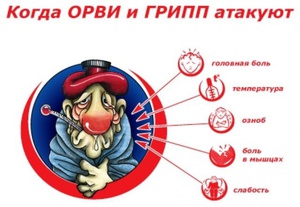
They can be found in any pharmacy in pure form or in combination with other ingredients. Most often it can be caffeine, vitamin C, chlorpheniramine maleate, or phenylpropanolamine hydrochloride. The first two components stimulate the central nervous system and increase performance. And the following ingredients help to cope with nasal congestion and itching. Thanks to this combination, it turns out not only to reduce the temperature, but also to get rid of the swelling of the nasal passages.
Throat preparations
Often, with ARVI, throat diseases join. They bring pain, inflammation and soreness. As a result, it hurts a person to swallow food, he wants to cough. The most common are:
- pharyngitis,
- tonsillitis,
- laryngitis.
To treat them and relieve all unpleasant symptoms, special drugs are needed. They have anti-inflammatory, antiseptic, cooling effects. You can choose a tablet form or a spray. Usually the tablets dissolve. There are quite a few options for tablets and each of them performs its own function. Some relieve pain and help relieve coughing, others have an antiseptic effect.
In some preparations, you can find the addition of eucalyptus oil or peppermint. In addition to a pleasant smell, they have a bactericidal and antiviral effect, which only helps in the treatment of the throat. They are also able to reduce the swelling of the larynx, which relieves pain and allows you to swallow food calmly.
Rhinitis and its treatment
A runny nose, even without a temperature, negatively affects a person's condition. The head begins to ache, it is impossible to breathe normally, the nose is constantly stuffy or runs out of it. Effective treatment aims to relieve these symptoms. Depending on the condition, the drug will be selected.
There are nasal drops or medicine in the form of a spray. Everyone chooses what is more convenient for him. Such drugs can be of short, medium and long duration of action. If the runny nose and nasal congestion is not too great, then products with a short to medium duration of action are suitable. But to eliminate large congestion, especially at night, it is better to use long-term drugs.
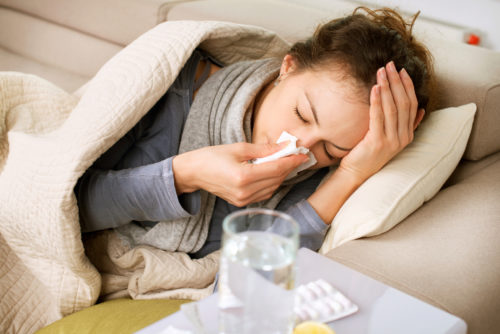
If the runny nose and nasal congestion is not too great, then products with a short to medium duration of action are suitable.
Some recommend, in the absence of a runny nose, but with nasal congestion, to drink antihistamine tablets. They are really able to relieve puffiness and improve nasal breathing. After all, constantly breathing through your mouth is quite uncomfortable. And if the throat also hurts, then it is doubly worse.
If you don't feel like overloading your body with pills, you can try several home treatments. For this, rinsing the nasal cavities with salt water is suitable. For 1 glass of water, dilute 1 tbsp. a spoonful of salt. Rinse the nose with such a solution several times a day.
Aloe juice drops are also suitable. To do this, dilute it with water. There are 5 drops of water for 1 drop of juice. Some advise dripping onion juice, but you need to understand that it must be diluted with water. But even in this case, lacrimation and burning of the mucous membrane in the nose are not excluded.
Cough with ARVI
Often, one of the symptoms of a cold is coughing. It can be dry, unpleasantly scraping at the throat, and makes you doubt a simple cold. Cough treatment is mandatory, because it can complicate the cold and add problems in the form of bronchitis.
When coughing, take an expectorant and mucolytic. They will help thin the phlegm and remove it from the body. You can drink syrups or use ambroxol or acetylcysteine \u200b\u200btablets.
You can also apply paraffin ointments. They are usually applied in the evening before bed. Such ointments are good because they have a local irritant effect, have anti-inflammatory and antiseptic properties.
You can also use inhalation for cough with ARVI. The simplest and most affordable will be inhalation solutions with essential oils. Sometimes divorced is used in this capacity. medicineadded to hot water.
Vitamin complexes
Treatment of influenza and ARVI in adults is practically no different from the treatment of children. The only difference is in the choice of drugs. The same goes for vitamins. Since the patient does not want to eat normally in the first days, his body may lack vitamins and minerals. Especially when respiratory viral disease overtook in the winter. Indeed, at this time, even healthy adults lack vitamins.
There is a huge selection of vitamin complexes in pharmacies. By adding them to the list of medicines, it will be possible to cope with a cold faster. It is known that vitamins help to increase the production of mucus and immunoglobulin A, which prevents viruses from entering the epithelium. They also help to regenerate the mucous membrane faster.
It is advisable to choose vitamin complexes specially designed for taking a cold. They must contain vitamins C, groups B, A, E, PP.
In addition to relieving symptoms, some recommendations must be followed. They will help the body to clear the viral infection faster, recover and feel better. This does not require a lot of effort and financial costs. In fact, everything is simple and affordable.

Warm or cool plain water, unsweetened compote or tea are suitable as a drink, but sweet soda, cocoa or warm milk will not work
Drinking plenty of fluids is recommended. This will replenish lost body fluids and help get rid of the waste products of microorganisms faster. Plain water, unsweetened compote or tea are suitable as a drink. Soda, cocoa, or warm milk will not work. The liquid can be warm or cold, this is at the request of the patient.
Be sure to monitor the air humidity and room temperature. The higher the temperature and the lower the humidity, the worse. Dry hot air negatively affects mucous membranes by drying them out.
You need to ventilate the room several times a day. This will help reduce the concentration of viruses in the air. Wet cleaning also helps reduce viruses.
Nutrition for ARVI
Usually, during a cold, you absolutely do not want to eat. The body spends all its energy on fighting the virus and tries to develop immunity to it. Therefore, you should not load it once again and eat it through force. It is better in this case to refuse food and drink plenty of fluids.
You need to eat when the body asks for it. But the portions do not have to be large. As food, light is suitable, which does not overload the body. These can be broths, boiled vegetables, or light salads. It is also recommended to add fruit to the diet.
When the acute period of a cold passes, the former appetite will definitely return. Therefore, there is no need to try to force the patient to feed. Better to make him tea with a sandwich or light soup.
Complications of colds
In some cases, complications can join the common cold. This happens when:
- transferring illness on the legs,
- untimely treatment,
- a weak immune system
- the presence of chronic diseases,
- recently transferred surgery.
The elderly, people with diabetes mellitus or those with cardiovascular diseases can get complications most often. In this case, it is important to consult a doctor in time to find out how to treat ARVI in an adult with medicines and procedures that are necessary for recovery. The attending physician will prescribe an individual treatment based on the characteristics of the body.
There may be such complications from ARVI:
- inflammation of the bronchi,
- pneumonia,
- sinusitis, sinusitis,
- ear infection,
- problems with the nervous system.
Having identified the complication, its treatment begins. You should not do this on your own. The disease can become even more complicated, cause intoxication of the body and lead to death.
Do you need antibiotics for ARVI?
As you know, antibiotics act on bacteria, and with ARVI, viruses infect the body. Therefore, taking antibiotics is not recommended. But sometimes ARVI treatment in adults is delayed. In this case, the patient's condition does not improve at all and may even worsen. In this case, it is possible to prescribe antibiotic drugs.
Sometimes, due to the layering of the viral infection of the bacterial flora, you can not notice it. After all, all the symptoms are identical and they begin to treat a viral cold, without noticing the penetration of bacteria and their active reproduction. But determining which species is causing harm is rather expensive. Therefore, broad-spectrum antibiotics are prescribed.
If desired, you can find out which bacteria is causing the disease. It is enough to make an examination and place the material from the patient on a nutrient medium. But until the bacteria grow, time will be lost. Sometimes it takes several days for such research, but you absolutely do not want to lose them. Therefore, broad-spectrum antibiotics are used.
It is not advisable to assign them to yourself. Better to see a doctor. You need to take the drug exactly the amount of time that the doctor advises. Even if you feel better even before you stop taking antibiotics, this does not mean that you are already healthy. In the body, there are still bacteria weakened by the drug, which, after its intake, will revive again and begin to actively multiply.
Prevention of viral diseases
There is nonspecific and specific prevention of acute respiratory infections in adults. With a specific vaccination, vaccination is done 1-2 months before the possible period of illness. This helps to develop antibodies in the body in advance and the next time it meets the virus, the immune system will quickly cope.
- Wash your hands and do not touch the mucous membranes on your face.
- Ventilate the room and monitor humidity.
- Avoid large crowds.
- Temper the body, take immunomodulators and use vitamins.
Of course, such prevention will not help completely avoid a cold, but the body will be stronger. This will save him from a long period of illness and the disease itself can go away much easier.
Each person is susceptible to a number of diseases. One of these is acute respiratory viral infection... What is ARVI? This is a group of approximately similar diseases, it is characterized by damage to the respiratory organs. The causative agent of these diseases is viruses, but sometimes other pathogens, for example, many types of influenza, become such. In common people, ARVI is called a cold. This disease is transmitted by airborne droplets through particles of saliva, which are thrown into the air when talking, sneezing when a person coughs.
What is ARVI?
Signs of SARS in adults are the same pathogens as in children. SARS accounts for about 85-90 percent of all diseases. During epidemics, almost every second person gets sick, catching this infection. They occur mainly when the weather conditions change.
At the initial stage of ARVI, many adults, mistakenly believing that the disease will go away on their own, go to work, parents send their children to school. This is a very irresponsible decision in relation to your colleagues, classmates, classmates, and just to people who travel with you in public transport, because even with the slightest contact, you can very easily infect people around you. This disease is also transmitted through contaminated objects.
In many adults, the body does not perceive the causative agents of ARVI, therefore, immunity will not allow viruses to enter and develop in the body, but it can weaken due to constant stress, improper nutrition, poor environmental conditions, prolonged stay in a cold room, after which a person can easily catch a virus.
SARS: symptoms and treatment
So, what are the symptoms of ARVI and how to treat ARVI?
Any virus that causes the common cold has symptoms such as:

Lymph nodes may also become inflamed, there is a sore throat, and the nose is stuffy.
Influenza, unlike all other diseases, is characterized by the instantaneous manifestation of many of these symptoms, while in other diseases, inflammation of the respiratory tract comes first.
SARS symptoms in adults are usually less pronounced than in children.
The most the first signs of the spread of the virus in your body there is weakness and malaise, a slight sore throat, already at these stages the disease must be treated, and not go to infect others. Further, the sore throat increases, on this or the next day a slight temperature may rise, after which nasal congestion appears.
If you do not start treating ARVI at these stages, then breakage and chills may begin, which indicates a rise in temperature.
If the temperature is high, you need to start drinking antipyretic pills, after that you should consult a doctor, if the pills do not help, and the temperature is about 40 degrees, you should call an ambulance, the main thing is not to panic in such a situation, otherwise the temperature will become even higher from the experienced stress. Do not neglect going to the doctor.
If all illnesses proceeded according to the same scenario, one could simply read on the Internet what drugs to take and live peacefully, be sure that everything will go on on time. But this is far from the case, each person has an individual organism that reacts differently to viruses, and some drugs cannot be prescribed to oneself, there may be an intolerance to any element in this medication.
In addition to mild symptoms, there are those in which you need to call a doctor:

There may also be very severe pain in the area chest, because of which it is almost impossible to breathe, feeling of lack of air, sputum discharge of pink or bright red color, feverish state, without a constant high temperature.
In addition, you should consult a doctor if the symptoms of SARS do not go away within a week to ten days.
If an adult falls ill, and he can prescribe drugs for himself, based on what has helped him before, then the child should immediately be taken to a doctor for examination.
To exclude the possible consequences of ARVI, doctors prescribe the following:
- fluorography of the sternum;
- the patient donates blood, feces, urine for tests.
It is very easy to confuse the initial stage of ARVI with the initial stages of other more dangerous diseases, it becomes clear only after the appearance of any other more severe symptoms.
ARVI treatment
You can often hear that people do not treat ARVI, believing that it will go away by itself in a week. It doesn't matter how long the disease will take, in five days or in ten, the most important thing is what difficulties the body will have to face during treatment, what the losses will be. Therefore, you should not "start" the disease, it is important to immediately begin to eliminate the cause of the disease.
How to treat ARVI? To act on the cause of the disease, you need to apply the prescribed by the doctor antiviral, anti-inflammatory drugswhich contain a human immune protein - interferon. This is a group of proteins that the cell synthesizes to prevent the spread of the virus in the human body.
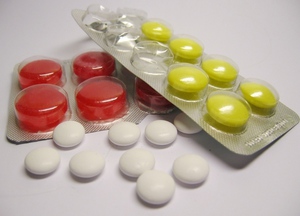 There are drugs that act quickly enough, one might say, instantly, they are quickly absorbed into the bloodstream, enter the cells, begin to fight the virus, but these medicines have a significant drawback. They are very narrowly focused, because of this, they so quickly enter the bloodstream. These drugs affect only the main types of viruses, that is, if the infection is caused by another pathogen, then the medicine will not work, since it is not intended to combat it specifically. These are medicines Zanamivir, Remantadin.
There are drugs that act quickly enough, one might say, instantly, they are quickly absorbed into the bloodstream, enter the cells, begin to fight the virus, but these medicines have a significant drawback. They are very narrowly focused, because of this, they so quickly enter the bloodstream. These drugs affect only the main types of viruses, that is, if the infection is caused by another pathogen, then the medicine will not work, since it is not intended to combat it specifically. These are medicines Zanamivir, Remantadin.
There are drugs that also act quite quickly, but they can fight a larger type of viruses, there are a lot of them, ranging from suppositories to all kinds of pills. These drugs, in general, do not have drawbacks, because after their use, the body will begin to produce antibodies that help remove all kinds of viruses.
There are also drugs that produce their own interferon. The use of this type of drug is the most acceptable and effective in combating various sources of the disease. They have a longer absorption rate than other medicines. Arbidol is one of the most useful, effective and multifunctional drugs.
There are many pharmaceuticals that can lower fever and have anti-inflammatory properties. But not all medications are necessary. For instance, the temperature should not be brought down to 37.8-38 degreesbecause a rise in temperature is a sign that the body has begun to fight the virus.
There are also some vasoconstrictor drugsthat should not be applied during inflammatory processesbecause they constrict the intestinal tract.
There are many medications that relieve nasal congestion, stop phlegm, and relieve sore throat.
There are a number cough medicines, which improve the general condition of the body, in addition, these drugs act to relieve fatigue, lethargy, and dizziness. In general, during ARVI, you should stay at home, in a calm environment, without stress. Bed rest should be observed. But in many cases, adults cannot quit their job, in this case, anti-cold drugs will come in handy.
 For a full and fast recovery you need to follow a diet, to be at rest, preferably in a supine position, refusing to read books, computer games, various electronic devices, when using which, eyes and head will start to hurt, and the temperature will rise.
For a full and fast recovery you need to follow a diet, to be at rest, preferably in a supine position, refusing to read books, computer games, various electronic devices, when using which, eyes and head will start to hurt, and the temperature will rise.
The diet should include healthy foods rich in vitamins that are easy to digest, should not be very bitter, salty, fatty foods. You need to eat often, although often there is absolutely no appetite, and if it is present, then there are still problems associated with swallowing food, they are associated with severe pain in the throat.
You need to eat a lot due to the fact that the body needs energy to fight the virus, which is obtained from complex carbohydrates (various cereals, legumes, potatoes) and building elements (proteins) obtained from low-fat animals, dairy products, and also from eggs.
During illness, all doctors advise to drink liquids, especially warm ones, such as sweet tea. It promotes the elimination of toxins, toxic structures that cause many disease symptoms.
What drugs should be treated for ARVI?
As mentioned earlier, there are many different drugs for the treatment of ARVI, the most in demand are antipyretic drugsthat contribute to the production of their own interferon. Among them, the most popular are the following:
- Ibuklin;
- Nurofen;
- Ibuprofen;
- Diclofenac.
Antihistamines - are used to eliminate many inflammatory processes, for example, to completely excrete mucus (sputum) from the lungs, to cleanse the nasal cavity and larynx.
There are also other drugs for the nasal cavity, for example, nasal drops, they are needed in order to remove congestion.
Vasoconstrictor drops help relieve swelling. But their constant intake is very dangerous. Rhinitis may develop. If these drugs are constantly used, then the mucous membrane of the nasal passages can become thicker, which will lead to the fact that a person will have to constantly use these drops for normal life, which in the future will serve as a permanent nasal congestion.
 The next in line are drugs for sore throat, there are many pills, sucking medicines, sprays.
The next in line are drugs for sore throat, there are many pills, sucking medicines, sprays.
But the most effective and most hated way of treating many, even adults, are all kinds of gargle... Many people use various solutions, but Furacilin is the most popular gargle.
Next, go cough drugs... Their main function is to make the phlegm less viscous, hence easier to cough up. The most important rule that every person should remember is that in no case should antibiotics be taken without consulting a doctor. They do not in any way help the body fight viruses.
Antibiotics fight only pathogenic bacteria in case of any complications. If you take antibiotics uncontrollably, harmful bacteria will get used to them, respectively, these drugs, if these bacteria spread, will not help.
Treatment of ARVI with folk methods
In addition to pharmacy drugs prescribed by doctors, there are alternative methods of treating ARVI. You can find many such methods on the Internet, but most of them are not only not working, they are also dangerous. Traditional methods are simple and easy, basically, they consist in a large number of receptions of various decoctions containing a storehouse of vitamins, the use of which contributes to a speedy recovery.
Complications of ARVI treatment
Despite all the simplicity of the treatment this disease, very often people have complications. Bacterial infections are quite common, this is due to the fact that the body is weakened. Basically ARVI turns into sinusitis.
The complication can be noticed only after some time, if the disease does not go away within ten days, the nose remains stuffy, the temperature does not drop. In this case, you should not even think about self-medication, you need to contact a highly qualified specialist.
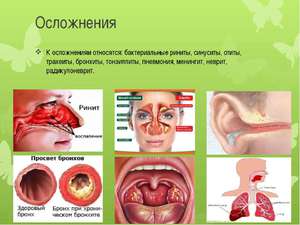 Acute otitis media - middle ear disease. This disease is an immediate complication colds, this ailment cannot be started, there may be serious infectious complications.
Acute otitis media - middle ear disease. This disease is an immediate complication colds, this ailment cannot be started, there may be serious infectious complications.
If your cough with greenish phlegm does not go away for a long time, you should consult a doctor, it is possible acute bronchitis - a disease that can lead to serious complications.
One of the most difficult to bear and difficult to treat complications of ARVI is pneumonia... In other words, pneumonia.
If, within ten days, the symptoms of ARVI do not subside, you need to consult a doctor, pneumonia should not be started in any case, earlier, when this complication could not be treated normally, there were often deaths.
Of course, ARVI is not the worst disease, but still no one wants to get sick, especially in the summer, when the weather is fine outside or there are any serious plans. To do this, you should constantly carry out the prevention of these diseases. Initially follows get a vaccinationthat will prevent your body from contracting infectious diseases.
Some adults go through the cycles of taking immune corrective drugs at certain times. Also, many adults take urgently any preventive medications, this is done if someone in the family or team is sick.
Should take antiviral drugs , especially during the active spread of infections, it is worth taking vitamin and mineral complexwhen vitamins are not enough from ordinary foods. In no case should you contact with infected people, because basically the infection is transmitted through saliva during a conversation, coughing, or sneezing, as well as through physical contact.
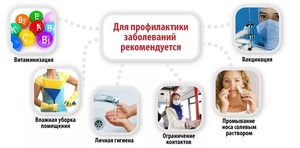 The most important rule is maintaining a healthy lifestyle, quitting smoking and alcohol, playing sports, eating only healthy foods, healthy and long sleep.
The most important rule is maintaining a healthy lifestyle, quitting smoking and alcohol, playing sports, eating only healthy foods, healthy and long sleep.
Zinc is a very good substance for ARVI. Scientists have proven that zinc intake within a day after the onset of symptoms, it can contribute to a speedy recovery, the destruction of viruses that have not even had time to spread.
During a cold, alcohol should not be consumed, it can irritate the pharyngeal mucosa, exacerbating the disease. You can only go to the bathhouse when all the symptoms have completely disappeared. After falling ill with this type of ARVI, a person will no longer catch this infection, since antibodies have already been developed in the body, but this does not mean that it will not be possible to become infected with any other virus.
In fact, ARVI can be cured in a few days. The main thing is not to start the disease.
Many people are used to thinking that the flu is not SARS. Such people say that the flu is a serious illness, and ARVI is a cold, "a trifle".
In fact, ARVI is the general name for a group of diseases, including influenza infection.
A feature of influenza in comparison with other causative agents of colds is its ability to cause epidemics, as well as a sharp and often severe course of the infectious process. However, ARVI, as well as measures for their prevention, treatment and possible complications, are similar.
ARVI stages
How long does an ARVI episode last in adults and children? To answer this question, we suggest that you familiarize yourself with the picture of the development of colds:
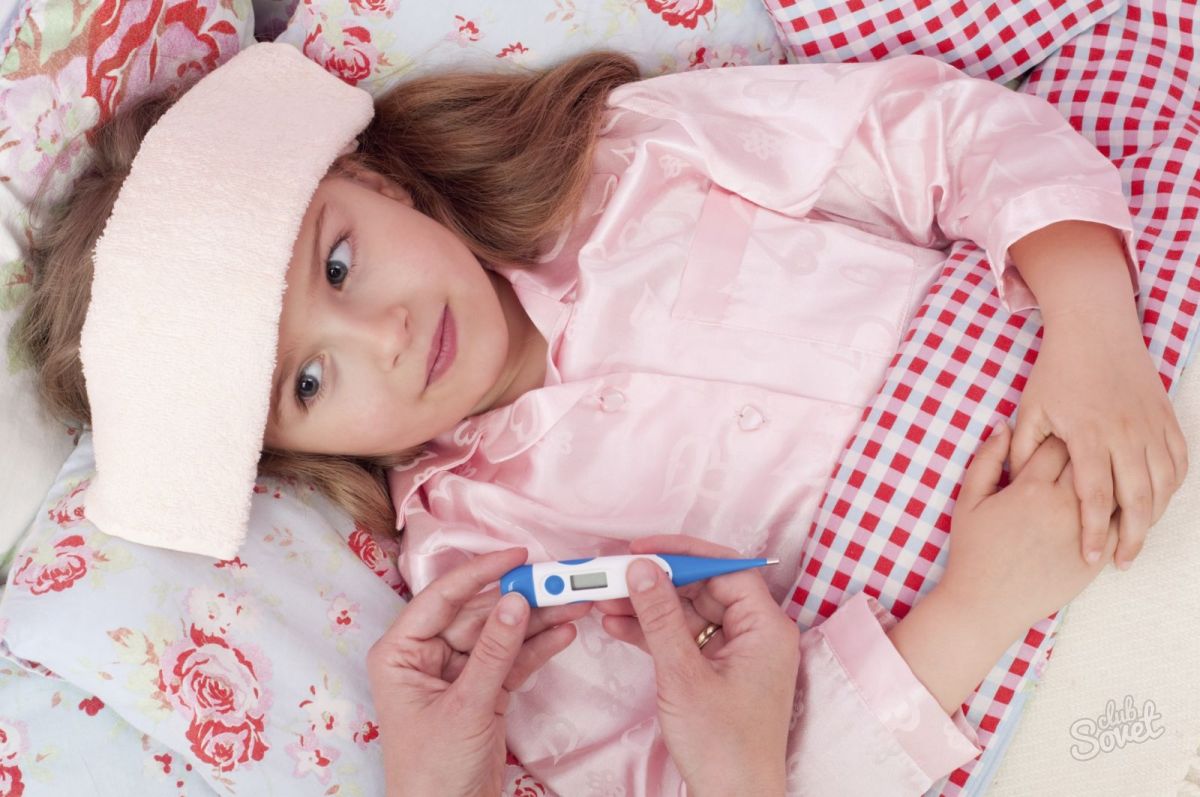
Thus, the duration of ARVI is about 7 days. With a cold in adults, the symptoms of intoxication are often mild - the temperature is normal (or subfebrile), the head and muscles ache slightly. As a result, many people carry ARVI "on their feet" - they continue to go to work, use public transport.
This is what leads to an increase in the number of cases, because a person with a cold is in any case a distributor of viruses, even if the disease has a mild course.
More about the incubation period
It is usually said that the duration of the latent period of a cold is 2-3 days. Often these numbers are not based on any epidemiological data. However, in 2009, an extensive study was conducted in the United States on the incubation period of acute respiratory viral infections in adults and children (Justin Lessler et al. Incubation periods of acute respiratory viral infections: a systematic review. Lancet Infect Dis. 2009). During the study, the following results were obtained:
Why know the length of the incubation period?
So, we saw how long the latent stage of the disease can last. Indeed, on average, its duration is 3-4 days. How can we use this?
For example, knowing the duration of the incubation period of ARVI will help in the fight against a cold in a child. So, if several people in a class or kindergarten group catch a cold, you can start active treatment measures.
It is known that treatment of viral infections makes sense only before and during the acute phase, and during PI it is most effective.
If, 6 days after contact with the patient, you feel normal, you probably have not been infected, you can rest assured.
Can a cold be detected at an early stage?
Thus, the incubation period is the latent stage of the disease. We never know for sure at what point we got infected. However, we can know at what point we communicated with a person with a cold. After contact with patients, it is recommended to wash your hands and nasal passages. The same should be done using public transport, toilet, etc. During epidemics, you can take antiviral prophylactic drugs. Try not to hypothermia, drink plenty of water, and consume enough vitamins and nutrients (fats, proteins, carbohydrates). All this increases the susceptibility to infections.
